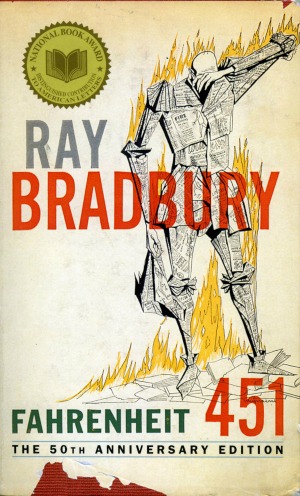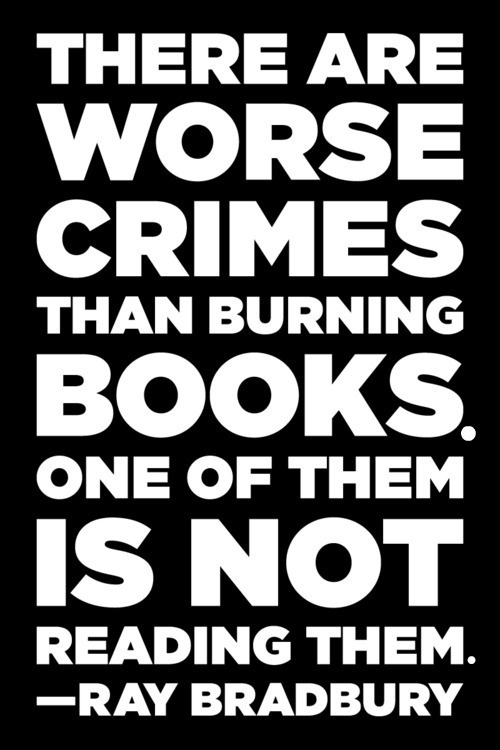I grew up reading voraciously. There were never enough books in the house to keep me busy. I got an adult library card at about age twelve because the children’s library card would only let me borrow four books at a time, and I’d read all of those long before our next weekly trip to the library. I thought long books were great; I’ve heard people complain about James A. Michener, but I liked his books, because they took longer than two days to read.
This post contains affiliate links; as an Amazon Associate, I earn from qualifying purchases.
 I remember reading Fahrenheit 451 by Ray Bradbury when my mom suggested it to me (it didn’t interest me, but I would read anything at the time). I didn’t like it (perhaps it’s one of those books I should read again) but I remember it. One thing that stuck with me was Ray’s ideas on the freedom to read.
I remember reading Fahrenheit 451 by Ray Bradbury when my mom suggested it to me (it didn’t interest me, but I would read anything at the time). I didn’t like it (perhaps it’s one of those books I should read again) but I remember it. One thing that stuck with me was Ray’s ideas on the freedom to read.
Ray Bradbury on the freedom to read
In Ray’s fictional world, books are banned. No one is allowed to read or possess any books, because they are bad. The society is almost one of zombies, people who have stopped thinking and are just going through life. The main character eventually joins a group of rebels who, though unable to possess books, have memorized parts of books or entire books. They band together to keep these books alive in their memories.
Books are so common today that it is easy to take them for granted and to forget why they are valuable. Thousands of books are produced by publishing houses every day. Bookstores hold hundreds of books and more are available online.
Everyone has a stash of books in their house. Don’t take me into a bookstore, as I won’t leave without buying at least one book. Or two or three. Even if they won’t fit on the bookshelf when I get them home, because I already have so many.
Books represent history, the ages of learning and thought that have gone before us. It is possible to go without them, as Ray shows in his book, and as happened before books existed; stories can be memorized and retold orally. Yet one book can reach thousands – more people than one person could reach. Stories can be preserved, passed on, long after the tellers have died and forgotten the stories. This is the power of the written word – to transcend borders and time.
Book Censorship Today
Yet today, there are books that are banned, even in countries like Canada that value freedom. I recently glanced over a list of challenged books. Some of the titles sounded like they were rightfully challenged—for pornography, immoral themes, bad language, etc.—but other titles on the list surprised me.
For example, here’s some of the titles and authors I recognized (though I haven’t read all of these):
- The Bible
- Lord of the Flies by William Golding
- Dance Me Outside by W. P. Kinsella
- To Kill a Mockingbird by Harper Lee
- Lives of Girls and Women by Alice Munro
- The Harry Potter books by J. K. Rowling
- Catcher in the Rye by J. D. Salinger
- Of Mice and Men by John Steinbeck
- Huckleberry Finn by Mark Twain
- On the Banks of Plum Creek by Laura Ingalls Wilder
My initial reaction to the idea that some of these books—like Twain’s—have been censored or forbidden is outrage. These are good books and students should be allowed to read them. If the books are written in a historical context, that should be acknowledged as they read. For example, Laura Ingalls Wilder wrote down her observations of Native Americans, and held the viewpoint of many of her time. Yet we can discuss that, with our students or children, as we read the book with them, helping them understand why such views were biased and incorrect. Banning these books erases that teaching opportunity.
Many of the books on the list were censored for being pornographic. I have to say that I probably agree with such censoring. There are books out there that are rightfully illegal, in my opinion. When I become a parent, I intend to review the books my children read, and to only allow them to read booksthey are ready for or that are appropriate for them. It is good that schools are being cautious about what books are available to the children.

So, where is the line drawn on censorship? Is it good or bad? In our society, the word itself draws negative connotations—like Hitler or Stalin banning good, moral books. We all know of times when Christians have not been free to read or have a Bible, and we should appreciate our freedom to do just that. Yet is all censorship bad? Or, in a just and caring society, is some censorship a good thing, to prevent immoral books from being produced?
Appreciate the freedom to read
As a reader, I have a long list of books that I want to read and a long list of books that I have read and loved. I want to learn from the books that I read, to see new worlds and new ideas. As a writer, I want to see my own books on shelves, well-read and loved. I want to see people touched by my stories and my writing. All of this is because in our country—unlike in Ray Bradbury’s book—we do have the precious freedom to read.
For more about banned books and the freedom to read, drop by FreedomtoRead.ca. Freedom to Read Week is usually at the end of February; for 2020, it’s February 23 – 29.

2 Comments
I underestimated the value of books until I was flat on my back for four months after foot surgery. Boy was I ever glad for the written word.
I put your link on my profile section. I couldn’t figure any other way to do it so I just followed the same code writing that the template did. Not bad for a technologically challenged person.
The next installment on the story is going on the site today.
I’ve been grateful for books at times like that too! Nothing like a good book for company when you are ill or physically confined. 🙂